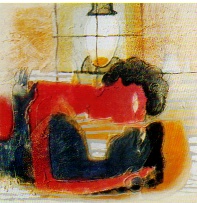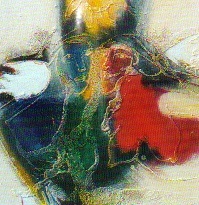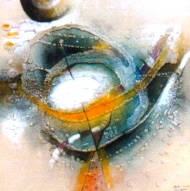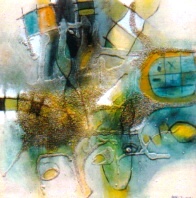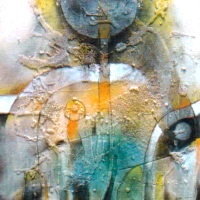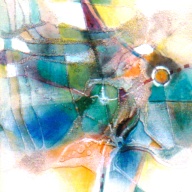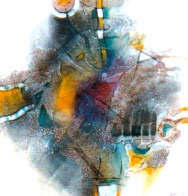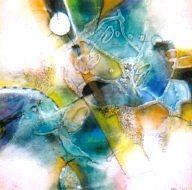Syed Iqbal: A Long Day's Journey
Robert
J. Lewis
His art has been exhibited in the prestigious Bengal Gallery
of Fine Arts, he has published 3 novels and several books of short stories,
has illustrated many children’s books. In 1990 he was awarded the prize
for best illustrator by the Bangladesh National Book Center. He has published
100ds of cartoons in his country’s newspapers, has been the guest of
honor at Bangladesh’s political establishment, and enjoys national celebrity
status. But all of this came to an abrupt end when he left his country in
1994, and came to America, finally settling in Montreal, Canada.
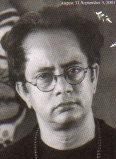 Like
a foreign doctor whose accreditation isn’t recognized outside his country,
Syed Iqbal’s art has not been recognized in his new homeland, Canada.
Hauling his paintings from one gallery to another only to meet with rejection
after rejection, Syed could have never imagined that he would find himself
begging for gallery space in the land of plenty. He finally awoke from the
nightmare he had been living for 7 years – with the exception of 3 solo
exhibitions -- when the Shayne Gallery) invited him to exhibit his work from
his most recent series, Tears of Nature, a protest against the ‘butchering
of nature by mindless acts of civilization.’
Like
a foreign doctor whose accreditation isn’t recognized outside his country,
Syed Iqbal’s art has not been recognized in his new homeland, Canada.
Hauling his paintings from one gallery to another only to meet with rejection
after rejection, Syed could have never imagined that he would find himself
begging for gallery space in the land of plenty. He finally awoke from the
nightmare he had been living for 7 years – with the exception of 3 solo
exhibitions -- when the Shayne Gallery) invited him to exhibit his work from
his most recent series, Tears of Nature, a protest against the ‘butchering
of nature by mindless acts of civilization.’
I interviewed Syed Iqbal, a man of remarkable candor, humility
and sensitivity, in the sparsely furnished office of a friend. The trials
of the past 7 years have left their mark on his erstwhile smooth and handsome
features, an artist for whom remembrances of times gone-by have become synonymous
with loss.
MONTREAL SERAI: Why do you paint?
SYED IQBAL: I have to paint, to express
my life, my feelings, my emotions, my desire, my hatred, my fears. I can also
do this through writing, but painting is my first choice.
MS: Your Father never approved of your
decision to become an artist. How did this affect you?
SYED IQBAL: My Father wanted me to become
a doctor or engineer, and he was uncompromising. I was therefore obliged to
leave home at the age of 20. The early years were very difficult, marked by
excess and self-abuse. I encountered a cold and indifferent world outside
of my home, and without family support – it was sometimes unbearable.
For many years I resented, even hated my Father, his attempt to rule my life.
Only at the very end, when he was dying of cancer, did he realize he made
a big mistake. By then, of course, it was too late. I forgave him, but the
ache will never go away; he could have been with me all of these years. I
think it is a universal law that we always want to please our parents.
MS: After enjoying great success in your
home country, what was it like coming to America and not receiving recognition
for your art?
SYED IQBAL: It was a painful, humiliating
experience, which I hope is behind me now. At first I didn’t understand
it, because my art has nothing to do with Bangladesh. It’s very abstract,
very universal, it could come from anywhere. But then several years passed
and strange thoughts came into my mind: I began to wonder if my work was being
rejected because of the color of my skin, or my heavy accent. And then I began
to wonder how this experience was affecting my teenage daughter, whom I did
not want to expose to my low self-esteem.
MS: Did you begin to doubt your abilities?
SYED IQBAL: Thank God, never. I never
doubted my ability. That would have been the end of me.
MS: The principle of Eros plays a major
role in your art.
SYED IQBAL: And also my life. When I
was a very young boy I realized that I was different: my friends wanted to
play soccer, I wanted to paint. But it wasn’t easy being different,
and since I can remember I have been very vulnerable to deep depression. As
I grew older, I found relief and escape in the company of women. Sometimes,
just being in the presence of a beautiful woman, who need not even be aware
of me, is sufficient to alter my mood and bring me back to life. Of course,
this weakness has been very difficult on my family; but I have never lost
sight of the fact that my wife and child are my anchors in life, as they have
come to understand my artistic temperament. My wife has on many occasions
saved me from myself. In fact I would have probably succumbed to alcohol and
drugs if I hadn’t met her when I was younger and quite out of control.
MS: As I look at the whole of your artistic
output, I notice you are gradually abandoning figurative painting for abstract.
Is this deliberate on your part?
SYED IQBAL: I have never set out to become
an abstract painter. What I have been discovering over my career is that painting
things has not brought me any closer to them. That is why I had to stop copying
them because I realized that these things themselves are barriers to what
they really are, to what is behind them. I know this must sound strange, but
only through abstract art am I able to capture the smell of something, or
the suffering in someone’s work shoes. If I decide, for example, to
paint an apple, as an artist I have to become an ant so I experience how the
surface and skin of the apple feel, and then I have to become a microbe and
penetrate the apple in order to come out dripping of apple. Only then will
I be able to capture the essence, or smell, or gift of what an apple is. But
I haven’t completely abandoned figurative painting: in some of my abstracts
there are hints of recognizable things that can be symbolic.
MS: On a more personal note, does it bother
you that your daughter is losing her heritage, is becoming Canadianized?
SYED IQBAL: It bothers me that one day soon my daughter
will come to look at me as a stranger – someone from the old country.
We sort of joke about it now: she listens to Rap while I listen to Raga
but only one of us is amused.
Canada is a unique place that is constantly changing and absorbing new
influences. I believe my daughter is leaving something positive of her culture
here as she is being transformed by what is already established. So far,
I have no reason to complain or regret my decision. I came to Canada to
provide her with more opportunity and to try to establish myself as a painter.
I have learned to be thankful for the smallest pleasures and successes in
life. My daughter doesn’t want to return which means she is happy
here – and that makes me happy.
MS: Why did you decide to settle in Canada
instead of the United States.
SYED IQBAL: It’s easier to assimilate
in Canada. And I believe there are more opportunities here. The melting pot
is a myth in the United States: it takes many generations for some immigrants
to feel like Americans. In Canada, it happens much faster.
MS: I wish you all the best, Syed Iqbal.
Tennessee Williams would designate you as one of the good guys. May your tribe
increase.

SHAYNE GALLERY
5471 Royalmount Ave. Montreal, Quebec H4P 1J3 Tel. (514) 739-1701
All pictures © Syed Iqbal
 Like
a foreign doctor whose accreditation isn’t recognized outside his country,
Syed Iqbal’s art has not been recognized in his new homeland, Canada.
Hauling his paintings from one gallery to another only to meet with rejection
after rejection, Syed could have never imagined that he would find himself
begging for gallery space in the land of plenty. He finally awoke from the
nightmare he had been living for 7 years – with the exception of 3 solo
exhibitions -- when the Shayne Gallery) invited him to exhibit his work from
his most recent series, Tears of Nature, a protest against the ‘butchering
of nature by mindless acts of civilization.’
Like
a foreign doctor whose accreditation isn’t recognized outside his country,
Syed Iqbal’s art has not been recognized in his new homeland, Canada.
Hauling his paintings from one gallery to another only to meet with rejection
after rejection, Syed could have never imagined that he would find himself
begging for gallery space in the land of plenty. He finally awoke from the
nightmare he had been living for 7 years – with the exception of 3 solo
exhibitions -- when the Shayne Gallery) invited him to exhibit his work from
his most recent series, Tears of Nature, a protest against the ‘butchering
of nature by mindless acts of civilization.’
